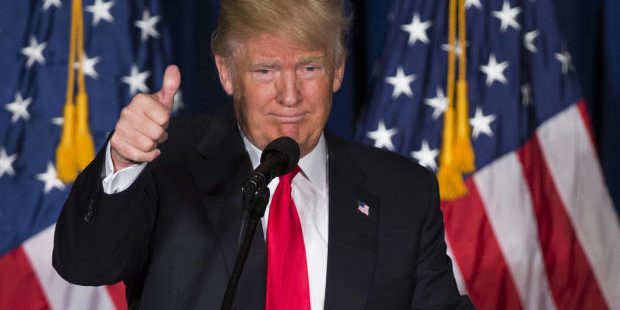
Trump opposed Iraq. Hillary voted for war: Let’s take his foreign policy vision seriously
Trump gets some things very wrong. But today’s speech was still daring, spot on and important contrast with Hillary
Donald Trump on foreign policy. You start out thinking this is going to be roughly akin to George W. discoursing on, say, phenomenology or that Camus novel his handlers made him pretend to be reading one summer when the world was waking up to how stupid Bush II actually was. Hopelessly silly, an adventure in buffoonery.
I think we need to think again. I urge everyone to watch Trump as he delivered his big foreign policy banana Tuesday at the Mayflower Hotel in Washington. I am not a Trump man by any stretch, and I will not pretend to assign percentages to what Trump got right and what wrong. Only this for now: What he gets wrong he gets very wrong, while what he gets right he gets stunningly, pithily right. It is not a combination destined to prove at all workable. But in a single morning he has made himself worth listening to, from whatever distance one may choose.
The semiology Tuesday was clear and ought not be missed. A few blocks from the White House, the Mayflower has been associated with presidential politics for nearly a century. Coolidge spoke there; FDR stayed there before one of his inaugurations. More curiously, Judith Exner and Monica Lewinsky also found the Mayflower a convenient billet during the Kennedy and Clinton years respectively. The place lends political weight to the occasions it hosts.
The speech is on a YouTube feed here. The transcript, courtesy of Time, is here.
I do not know how long earlier it was planned, but it came a day after Trump swept five Republican primaries and now stands just short of certain to have enough delegates to avoid a contested GOP convention in Cleveland. And it was sponsored by The National Interest, the hawkishly conservative bimonthly founded by Irving Kristol in the 1980s and associated with the right-wing “realist” school. The realists have been among those quaking as Trump and the other Republican presidential aspirants have espoused something other than realistic foreign policy agendas.
Before taking up Trump’s remarks, this background is worth considering in itself. It suggests that elite party cliques and those known as Republican intellectuals—is this an oxymoron?—may be preparing to face the inevitable, avoid an internal coup in Cleveland and line up behind The Donald. It is worth taking note. David Brooks, Ross Douthat and these sorts of people may have to go quiet and eat some humble pie—which they will do in private while they bend their thinking to match the new orthodoxy, should one emerge along these lines.
As to Trump’s presentation, we have what it is and what it is not. It is interesting in both respects, but more the former than the latter.
It is not, to begin backwards, an accurate depiction of the world as it lies beyond our shores or America’s place in it. Neither did Trump describe foreign policy under Obama and before him the Clintons (President Bill, Secretary of State Hillary) with any sophistication. He displayed no knowingness in these respects. He is the novice in the foreign policy sphere that most people who have given the matter any thought have taken him to be all along.
“Our rivals no longer respect us,” Trump said at one point. In fact they’re just as confused as our allies, but an even bigger problem is they don’t take us seriously anymore. The truth is they don’t respect us.”
No, Donald. Our rivals think we are reckless but respect us the way one respects what is fearful. The word you are looking for is “admiration,” and you can forget about that across the board. And our allies are not confused: They know the score perfectly well. It is only we Americans who find our conduct abroad confusing.”And later: “America is going to be strong again. American is going to be reliable again. It’s going to be a great and reliable ally again. It’s going to be a friend again. We’re going to finally have a coherent foreign policy….”
No, Donald. Drop the nostalgia because there is no going back. You have to distinguish between a strong nation and one that is merely powerful. We are the latter, not the former. And our foreign policy is perfectly coherent: It is only that its purposes cannot be articulated to a democratically minded people whose ignorance of our conduct abroad is essential to sustaining it.
“I want to talk today about how to develop a new foreign policy for this country,” Trump began. It was an excellent opener. One can think of few things this country needs more urgently. When was the last time you heard any presidential candidate—or a sitting president or anyone else holding high office, for that matter—even raise the thought of a new foreign policy?
But the blur begins in the second half of the very same sentence: “… one that replaces randomness with purpose, ideology with strategy, chaos with peace.”
No twice more, Donald. One, there is nothing random and all too much purpose in the policy framework that has prevailed since global domination passed from an implicit to an explicit objective in the early years of this century. Two, ideology and strategy do not self-cancel: The former underwrites the latter.
But then three, something else: Trump may hardly yet grasp how right he was in suggesting that the cliques now making policy find chaos more useful than peace in any number of contexts. (If I start naming them I will not know when to stop.) The tradition of fomenting disorder, indeed, runs back as long as the American Century, a thread in the weave from the first.

